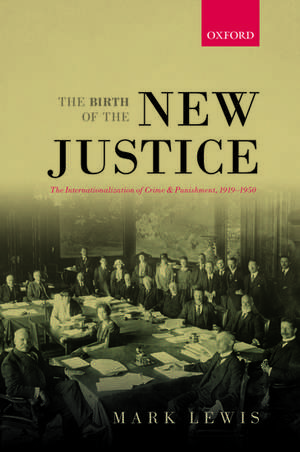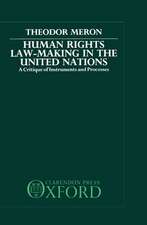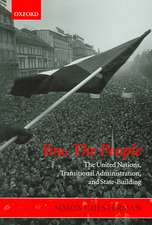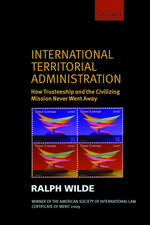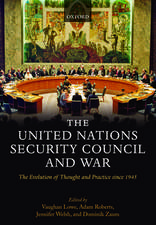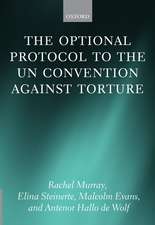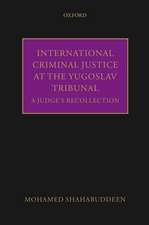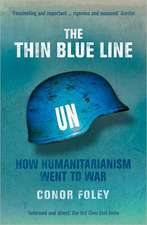The Birth of the New Justice: The Internationalization of Crime and Punishment, 1919-1950: Oxford Studies in Modern European History
Autor Mark Lewisen Limba Engleză Paperback – 10 aug 2016
| Toate formatele și edițiile | Preț | Express |
|---|---|---|
| Paperback (1) | 295.23 lei 31-37 zile | |
| OUP OXFORD – 10 aug 2016 | 295.23 lei 31-37 zile | |
| Hardback (1) | 849.95 lei 31-37 zile | |
| OUP OXFORD – 13 feb 2014 | 849.95 lei 31-37 zile |
Din seria Oxford Studies in Modern European History
- 30%
 Preț: 673.53 lei
Preț: 673.53 lei - 13%
 Preț: 278.29 lei
Preț: 278.29 lei -
 Preț: 222.12 lei
Preț: 222.12 lei - 26%
 Preț: 601.69 lei
Preț: 601.69 lei - 6%
 Preț: 234.19 lei
Preț: 234.19 lei - 16%
 Preț: 707.37 lei
Preț: 707.37 lei - 25%
 Preț: 522.10 lei
Preț: 522.10 lei - 17%
 Preț: 582.53 lei
Preț: 582.53 lei - 17%
 Preț: 583.54 lei
Preț: 583.54 lei - 16%
 Preț: 584.33 lei
Preț: 584.33 lei - 30%
 Preț: 582.12 lei
Preț: 582.12 lei - 30%
 Preț: 623.22 lei
Preț: 623.22 lei - 30%
 Preț: 486.56 lei
Preț: 486.56 lei - 14%
 Preț: 321.01 lei
Preț: 321.01 lei -
 Preț: 341.60 lei
Preț: 341.60 lei - 27%
 Preț: 832.43 lei
Preț: 832.43 lei -
 Preț: 309.69 lei
Preț: 309.69 lei - 30%
 Preț: 729.14 lei
Preț: 729.14 lei - 25%
 Preț: 877.94 lei
Preț: 877.94 lei - 12%
 Preț: 351.71 lei
Preț: 351.71 lei - 14%
 Preț: 297.87 lei
Preț: 297.87 lei - 13%
 Preț: 240.04 lei
Preț: 240.04 lei - 30%
 Preț: 671.46 lei
Preț: 671.46 lei - 30%
 Preț: 613.37 lei
Preț: 613.37 lei - 27%
 Preț: 662.35 lei
Preț: 662.35 lei - 17%
 Preț: 582.46 lei
Preț: 582.46 lei - 17%
 Preț: 581.77 lei
Preț: 581.77 lei - 16%
 Preț: 583.85 lei
Preț: 583.85 lei
Preț: 295.23 lei
Preț vechi: 341.57 lei
-14% Nou
Puncte Express: 443
Preț estimativ în valută:
56.49€ • 58.98$ • 46.75£
56.49€ • 58.98$ • 46.75£
Carte tipărită la comandă
Livrare economică 25-31 martie
Preluare comenzi: 021 569.72.76
Specificații
ISBN-13: 9780198783251
ISBN-10: 0198783256
Pagini: 360
Dimensiuni: 156 x 233 x 20 mm
Greutate: 0.54 kg
Editura: OUP OXFORD
Colecția OUP Oxford
Seria Oxford Studies in Modern European History
Locul publicării:Oxford, United Kingdom
ISBN-10: 0198783256
Pagini: 360
Dimensiuni: 156 x 233 x 20 mm
Greutate: 0.54 kg
Editura: OUP OXFORD
Colecția OUP Oxford
Seria Oxford Studies in Modern European History
Locul publicării:Oxford, United Kingdom
Recenzii
These chapters are small monographs, most of which are extremely well researched on the basis of archival sources and bring many new insights. Yet their sum does not create a history of international criminal law, but a detailed critical commentary on many of these histories of international criminal law. It is the great merit of this book that it carefully traces the discontinuities, the fissures and inner contradictions, and not least of all the political contingencies, which characterize the development of international criminal law. And nevertheless, as Lewis makes clear, the particular fragments remain in memory, surfacing again as reference points and not disappearing from history. In this sense, it is an immensely stimulating work worth reading.
Besides stimulating new insights for those already familiar with this fascinating subject, The New Justice can be highly recommended to those seeking an entry point into the field.
Besides stimulating new insights for those already familiar with this fascinating subject, The New Justice can be highly recommended to those seeking an entry point into the field.
Notă biografică
Mark Lewis is the co-author of Himmler's Jewish Tailor: The Story of Holocaust Survivor Jacob Frank, the oral history of a Polish Jew who was the head of a clothing factory at the SS-run labor camp on Lipowa Street in Lublin, Poland. Lewis received a Ph.D. in European history from the University of California, Los Angeles, and is an associate professor of European history at the College of Staten Island, City University of New York.
